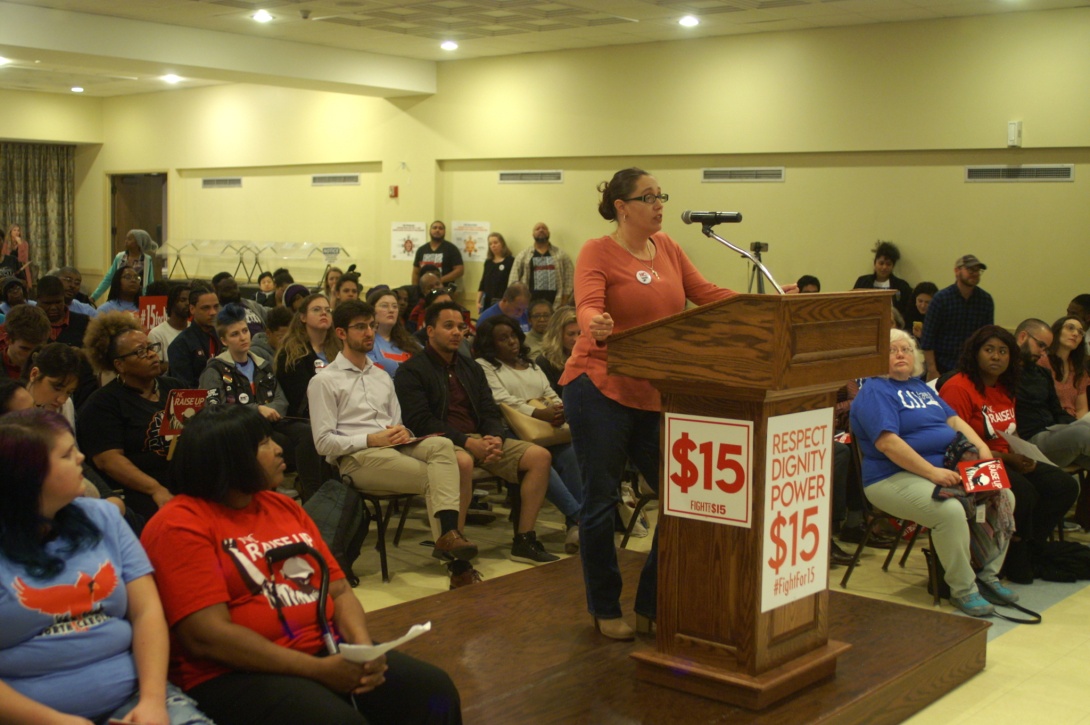Low-wage workers make case for raises to North Carolina candidates

At last week's people's hearing on the minimum wage, Sara Fearrington testified about her experience of trying to survive as a low-wage worker in North Carolina. (Photo via NC Raise Up.)
A coalition of workers' rights and allied groups held a people's hearing in Raleigh, North Carolina, last week where low-wage workers testified before elected officials and candidates for state office about living on the economic edge and how a wage of at least $15 an hour would change their lives.
Among those who spoke at the Raising Wages NC event at First Baptist Church was Wanda Coker, a manager at a Burger King in the state's Triangle region and a leader in the Fight For $15 movement. She described the campaign for higher wages as a "life and death issue." Sharing her personal struggles with pregnancy complications, diabetes, and kidney disease, she told the gathering she needs a kidney transplant that will cost her hundreds of thousands of dollars she doesn't have.
"Instead of receiving a paycheck I can live on, health benefits, or paid sick days," said Coker, who's worked for Burger King for 20 years and only recently began making $15 an hour, "my reward is a pile of medical bills that I can't afford to pay."
In her testimony, Coker cited research showing health care costs have jumped 21% in the last 10 years. But during that time, North Carolina's minimum wage has remained stuck at $7.25.
Largely because of the activism of the Fight For $15 movement, states including California, Connecticut, Illinois, Maryland, Massachusetts, New Jersey, and New York have passed legislation in recent years to gradually raise their state minimum wage to $15 an hour. But minimum wage hikes have been slow to come to the South, where there is an entrenched legacy of hostility toward organized labor and laws that make it harder to collectively bargain.
During North Carolina's 2019 legislative session, there were at least seven Democratic-sponsored bills introduced in the Republican-Controlled General Assembly to raise the state's minimum wage, but none got even a committee hearing. And of the 21 states that began this year with higher minimum wage laws, only two are in the South: Arkansas and Florida. Florida was among the seven states that automatically increased wages this year based on the cost of living, while Arkansas was one of the 14 states that raised wages due to previous legislation or ballot initiatives.
But workers are continuing to organize in the South — and they're getting the attention of people running for office. For example, Democratic presidential candidates have joined low-wage workers on picket lines in North Carolina and South Carolina, and all of them say they support raising the minimum wage to $15 an hour.
Among the elected officials who attended the North Carolina forum were state Reps. Allison Dahle, Rosa Gill, Zack Hawkins, and Verla Insko, all Democratic co-sponsors of legislation to raise the state minimum wage. Also attending was Democratic state Sen. Jay Chaudhuri, who urged the crowd to stay focused on the legislature because, as he said, "if we want to build an economy that works for everyone, we need more allies in the General Assembly."
The forum also drew a number of state legislative candidates. They included Democratic candidates Joe Parrish for state House and Pierce Freelon for state Senate, as well as the campaign manager for Democratic state Senate candidate Gray Ellis. But also in the room supporting a minimum wage hike was Republican state House candidate Clark Pope and Libertarian House candidate Michael Nelson, who said he came to the forum with the intention of opposing a raise but changed his mind after hearing people's testimonies.
Many of the candidates and elected officials shared personal stories of growing up in working-class families and listened to those still struggling from paycheck to paycheck. They included Jeanine McDonald, who served in the Navy but upon returning home to North Carolina found that the only jobs available to her in Fayetteville were low-paying, and Sara Fearrington, a waitress who earns the tipped hourly minimum wage of $3.10 — even when customers don't tip, something she says happens daily. She noted that two-thirds of tipped workers are women, the majority are at least 25 years old, and one in four are at least 40.
"This means that a lot of workers who depend on tips are mothers like me, who are doing everything they can to provide for their children," Fearrington said.
Tags
Rebekah Barber
Rebekah is a research associate at the Institute for Southern Studies and writer for Facing South.
